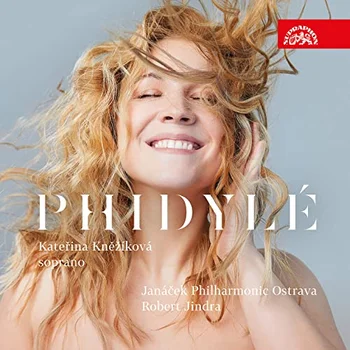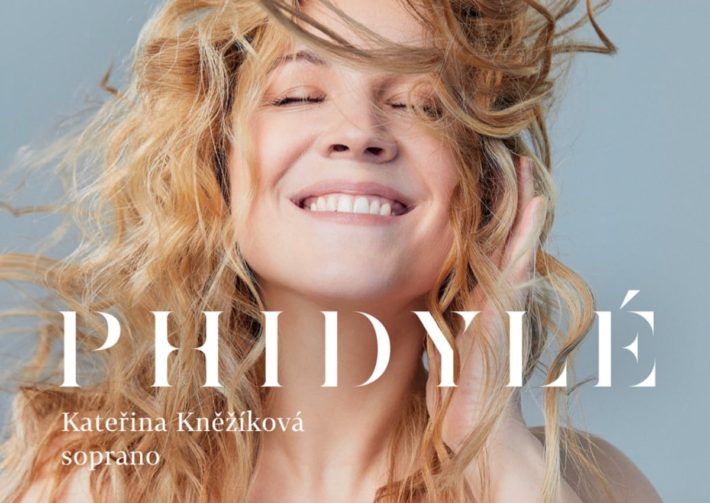Soprano Kateřina Kněžíková collaborates with Robert Jindra and the Janáček Philharmonic in a series of songs from the turn of the 20th century. Featuring composers such as Martinů, Duparc, and Ravel, these songs carry a special significance for her, being “particularly close to her heart and voice”, to quote the booklet. At the same time, they also reflect an appreciation for a collage of literary influences ranging from Chinese poetry to French Symbolism. Connecting these seemingly distinct dots, however, is a common thread—what the singer says is a touch of exoticism and a tinge of Impressionism.

Bohuslav Martinů’s Magic Nights has an unintentional but uncanny connection to the events of the composer’s own life. Born in the Czech Republic but having moved to France and later the US, the idea of “home” became something Martinů would constantly seek. The texts to which these works are set reflect the wistfulness of being in a distant land. The Mysterious Flute (track 3) is particularly lovely. It has a surprisingly long orchestral introduction that takes up a good chunk of the song, but this sets the ensemble and soloist on equal collaborative footing. The instrumentalists do a fine job of introducing the piece’s inviting whimsy into their parts early on. Curiosity is subsequently satisfied when the music blossoms into its high point toward the conclusion. Kněžíková’s performance is on par with the orchestra’s efforts. What immediately struck me was the exceedingly clean sound she has: her pitches never fail to be spot-on and her singing has a pronounced clarity. It’s not only technical precision, though: she fills the lines with an eager wonder that is not without a certain dreaminess.
Henri Duparc’s Phidylé (track 6) is interesting in how it blends elements from different artistic ideologies of the late 19th century. The music itself is unmistakably Wagnerian in its harmonies and dense orchestration. The poem upon which it is based, however, speaks to something quite different. Leclerc de Lisle was part of the Parnassian movement that bridged the gap between Romanticism and Symbolism; indeed his writing captures a pseudo-Impressionistic essence of Nature. Kněžíková and the orchestra work together to bring out these elements in the performance. The vocalist’s smooth lines and sostenuto reflect the poem’s peace and innocence. The ensemble delivers drama though an invigorating and panoramic sound image of the pastoral setting. Renée Fleming also has a lovely recording she did with the Philharmonia Orchestra. The thickness of her voice adds an enveloping layer of warmth while the softer sections possess some subtle but beautiful phrase contours. And so, where Kněžíková’s Phidyle is more youthful, Fleming’s is perhaps more soulful.
The Cinq mélodies populaires Grecques are based on traditional songs from the Greek island of Chios, near Turkey. In Ravel’s vibrant settings, one cannot miss his signature sound. La-bas, vers l’église (track 9) features a haunting interplay between consonance and dissonance. In the jubilant Quel galant (track 10), the folk element assumes its full glory with the tambourine rattles, while the xylophone adds touches of lightheartedness. As far as the singing goes, however, I did feel that while listening to all the songs, a sort of uniformity gradually took over. Kněžíková is undeniably expressive, but the darker chapters like vers l’église need more nuancing to temper the shine of her voice and introduce more variety to the set.
In its concept and intelligent choice of works, this album successfully reflects Kněžíková’s earnest efforts to establish her personal voice through music she cares deeply about. It also plays to her strengths: her naturally bright and translucent timbre is well suited on the whole to the Impressionist style that runs through many of the songs. The orchestra should not remain without praise, either: I found that it often added a wonderful range of depth and scale to the music. A solid album worthy of repeated listening.
“Phidylé”
Works by Martinu, Duparc, Ravel, Szymanowski
Kateřina Kněžíková – Soprano
Janáček Philharmonic Ostrava
Robert Jindra – Conductor
Supraphon, CD SU42962



















